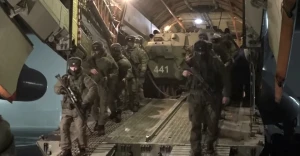
Effective government communication crucial for Ukraine's EU integration reforms. Espreso's interview with MEP Marina Kaljurand
Member of the European Parliament Marina Kaljurand stresses Ukraine must engage with skeptical countries and adjust its reform approach, while improving communication with Ukrainians to ensure support for European integration
She said this in an interview with Espreso.
Ukraine's European path remains the country's strategic course despite challenges from both Russian aggression and internal issues. European integration will depend on progress in meeting European requirements and could serve as a convincing argument to overcome skepticism from certain countries.
Marina Kaljurand emphasizes that, to avoid mistakes and accelerate the process, Ukraine could draw on the positive experiences of other countries, particularly the Baltic states, which faced both internal pressure and Russia's attempts to discredit reforms on their path to Europe.
More on this and much more in the interview.
What is your assessment of the West's attitude to Ukraine's European prospects?
We all say the right things, but when it comes to practical help - whether military, economic, financial, or any other - the results remain very low. The most dedicated financial supporters are the Baltic countries. Although small in size, they make a significant contribution to Ukraine’s military support, equivalent to 0.25% of their GDP. However, unfortunately, I do not see much enthusiasm from some of the EU partners and NATO allies. This is disappointing. I do not believe that EU integration and Russian aggression can be completely separated. One influences the other, as the outcome of the war will impact not only Ukraine, but also Europe and the global order. These things are interconnected.
Now, regarding your progress in negotiations. Let’s be honest and straightforward: you received candidate status and began negotiations only because of the war. Without this, Ukraine would have been far from meeting the EU's requirements. Whether it’s war, corruption, or democracy in the broader sense - there are many issues in the country. Due to the war, due to the suffering of your people, the EU decided to grant you candidate status and start accession talks. But even in this regard, support from the EU remains weak.
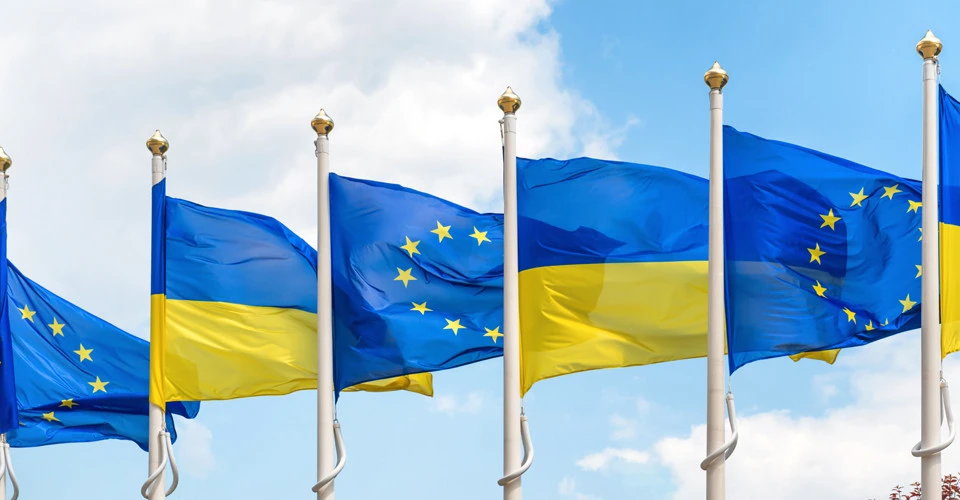
For reference, Ukraine's aspirations for EU membership intensified after the 2013-2014 Revolution of Dignity. The signing of the Association Agreement with the EU in 2014 solidified political and economic integration. Russia's full-scale invasion in 2022 became a catalyst for accelerating this process. On February 28, 2022, Ukrainian President Volodymyr Zelenskyy submitted an application for EU membership, requesting expedited consideration. On June 23, 2022, at the EU summit, leaders of all member states unanimously supported granting Ukraine and neighboring Moldova candidate status. The first Intergovernmental Conference between Ukraine and the EU took place on June 25, 2024, in Luxembourg, marking the official start of Ukraine’s accession negotiations with the European Union.
You need support in reforms, expert guidance, and the presence of partners when implementing changes. However, this journey will not be quick. Therefore, I would like to adjust the expectations of Ukrainians who hope to become EU members in a few years. This will not happen quickly. I can say this from the podium of the European Parliament, I can say this when talking to my colleagues, and I am saying it to you here, considering what is happening in Europe and, more broadly, in the global political perspective.
To become a member of the EU, you need 100% support from the Union. This is a matter decided by all member states, all 27 countries. Today, I simply do not see enough political will (within the EU). We can see what Prime Minister of Hungary Viktor Orbán and Prime Minister of Slovakia Robert Fico are doing. They are not friends of Ukraine today; they are friends of Russia.
They are sabotaging the introduction of sanctions, promoting the continuation of the war, and talking about a "Putin peace." This means Ukraine's capitulation. It means Russia's victory. So, the situation is very complicated. Furthermore, we do not know what to expect from the next U.S. president. And when I say we do not know, I say this honestly. During his first term (Donald Trump, 2016-2020), there were people around him who at least tried to keep him on course with NATO and international commitments. But if you look at the list of appointments (in the current U.S. administration), I have doubts whether these people will support Ukraine until its victory. A lasting peace in Europe will not come, and this will directly affect your ambitions for EU membership.
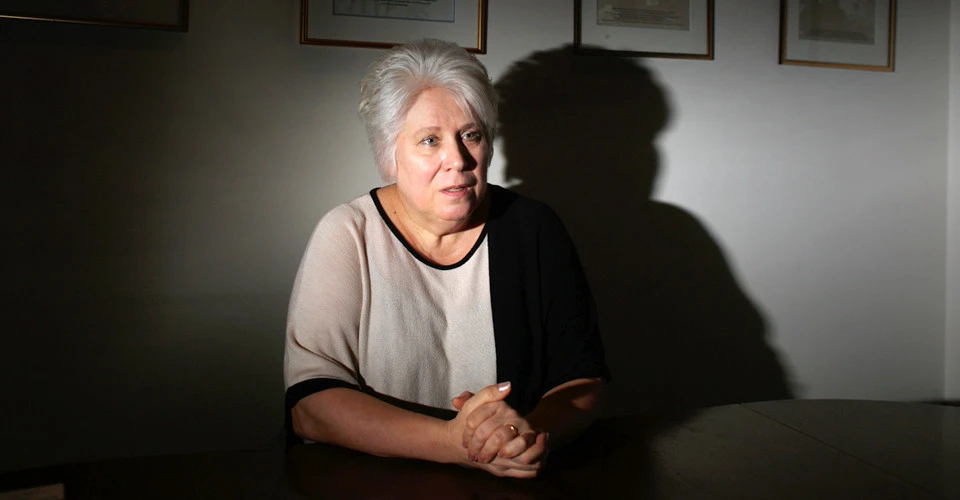
Marina Kaljurand, photo: gettyimages
You mentioned timelines. We often talk about 2030 as a political target or deadline for Ukraine's EU membership. Do you think this year is realistic for meeting all the negotiation requirements, or could it be extended to a later period?
This is a very difficult question. I don't have an answer to it. I think even if you manage - and it's very difficult - to meet all the key EU requirements, even if you carry out all the reforms, I’m not sure there will be enough political will within the EU to accept Ukraine into the Union.
I remember my country’s accession 20 years ago. It was difficult because no one was inviting us to join the EU or NATO. It was the determination of our country and nation to become part of the EU. For us, it was the only way to survive as an independent state. For you, it is the same choice.
But you must understand that there are many skeptical voices in the EU. Some believe that the enlargement 20 years ago was a mistake and that the 10 countries that joined back then did not fully meet the EU criteria. There are politicians who argue that the accession of Romania and Bulgaria was a mistake due to their failure to fulfill obligations. So, even if you do everything necessary, there also needs to be political will within the EU, and today I highly doubt that it will appear by 2030.
What can we, as a country, influence? What steps should Ukraine prioritize to accelerate this process?
You need to convince those who are hesitant. It's easy to talk to Estonians, Latvians, Lithuanians - they already support you. Speak with the countries that are more skeptical. Convince Hungary, Germany, France, and other large countries that were skeptical during previous expansions.
And one more thing. You must work with public opinion within your country and with your own mindset. I remember when we were joining the EU and implementing reforms, we told people: "These are the requirements of Brussels." But that is the wrong mindset. You are making reforms not because of Brussels, but for your own people, because it's the right thing to do. It benefits your society, your economy. So rethink why you are implementing reforms and communicate more with those who are skeptical within the EU.
On this path, there may be other obstacles beyond the political perspective and views of certain countries. For example, in areas such as agriculture, energy, economic sectors, and especially energy dependence on Russia, which still persists.
Ultimately, everything you mentioned is a political criterion. Some countries will oppose it due to agriculture, others for different reasons. So, in the end, it all becomes a political issue.
And I must say that even farmers in Estonia are raising questions about Ukraine and its agriculture. We try to explain that there will be a transition period, just like when we joined the EU. But if even Estonian farmers are asking such questions, imagine the discussions taking place in the agricultural sector of large protectionist countries in the EU, such as France.
We already saw farmers' protests on the streets last spring. Some of them were opposed to Ukrainian agricultural products, which were partly entering the EU markets illegally, especially grain that was supposed to go to African countries but ended up in some EU countries. This caused frustration among farmers. As a result, restrictions were introduced even on eggs, poultry meat, and other products.

photo: gettyimages
So, discomfort regarding agriculture already exists, and one can imagine that it will only intensify as the prospect of your EU membership becomes more realistic. Therefore, you must have answers to all these uncomfortable questions, explain the situation, and propose a clear plan that will alleviate partners' fears about Ukrainian agriculture. Explain that you will integrate into the EU market gradually, through a transitional period with clear rules. It won't be a "wild west."
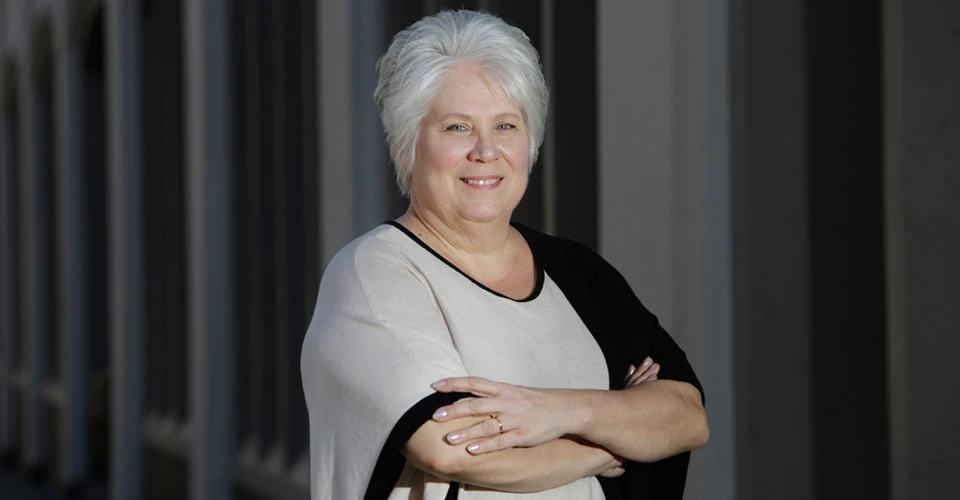
Marina Kaljurand, photo: gettyimages
For reference, the Ukrainian government is taking steps to implement a comprehensive set of measures to integrate the agricultural sector with the European Union. These steps focus on harmonizing legislation, adopting European standards, and supporting sustainable agricultural development. One of the key areas of this work is the adaptation of national legislation to EU norms, which covers about 40% of all adaptation procedures related to the agricultural sector. Additionally, Ukraine has developed a Strategy for Agricultural Development and Rural Areas until 2030, which outlines priorities and measures for the sustainable development of the agricultural sector, in line with European requirements and standards.
You mentioned the hesitation of some countries, and we are observing anti-Ukrainian lobbying in the EU from far-right groups, fueled by external factors such as Russia and China. Do you have some strategies you could advise us on how to deal with this?
How to deal with this? I don't have an easy answer. It's a very complex issue. When I talk to my colleagues in the European Parliament, I ask them if they have been to Ukraine, if they have seen the consequences of the war. For many of them, the war is something distant that doesn't affect their everyday life. They don't care because they don't have Ukrainian refugees. The further you are from the Russian border, the less people care about Ukraine and the war.
My advice is to bring politicians to Kyiv. And not just for meetings with your political leadership, but to visit places like Irpin and Bucha. Give them the opportunity to see the people, to talk to them.
I want to say that after visiting such places, I simply cannot remain indifferent to Ukrainians. It's impossible. I saw the real suffering of real people. These are not just numbers on paper - it's real pain. Therefore, in my opinion, you need to work on a personal level, influence politicians through these stories, and give them this experience.
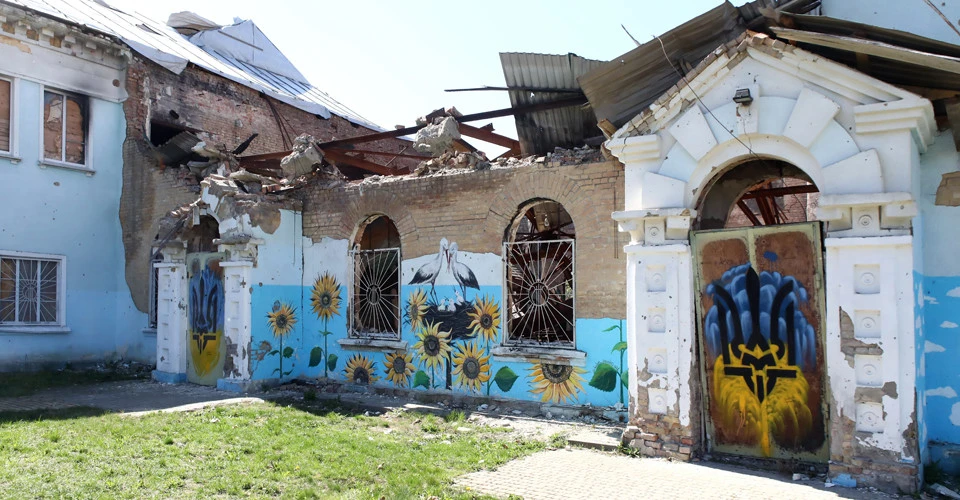
Central House of Culture in Irpin destroyed by Russian shelling, photo: gettyimages
Yes, they meet with President Zelenskyy, but I'm not sure that even he can fully convey this. However, of course, there are politicians you won't be able to change. For example, will you change Orbán? I don't think so. For him, Putin is a hero. He wants to be like Putin, like Trump. You won't change him. So focus on those you can convince.
This is not only about the EU but also the UN. If you look at the situation in the United Nations, I can say that we are losing the diplomatic war for Ukraine. When it comes to sovereignty and territorial integrity, everyone supports Ukraine. But as soon as the conversation turns to holding the aggressor accountable, to how to bring Russia to justice, everyone disappears. They don't care.
So even the special tribunal proposed by the EU does not have broad international recognition. We do not see representatives from Latin America or Africa in Kyiv. And while they sometimes visit, they then go to Moscow. This is a huge problem. Russia's aggression in Ukraine has become a purely European, Russian, and Ukrainian issue. Many in the UN do not see its global impact on the world order. Other aggressors are simply waiting to see what happens with Putin and decide whether to follow the same path.
My next question concerns the issue of corruption in Ukraine. It has always been a major challenge. There are certain myths about this that Russian propaganda actively uses against Ukraine. At the same time, there is still a significant problem with corruption within the country. How would you assess Ukraine's efforts in combating this challenge from the perspective of different European capitals?
I am not an expert in this area, so I will not speculate. I see the actions of your president, legislators, and institutions. I see that there are efforts to combat corruption. How effective are they? I cannot assess that - I simply do not know the details. But you are right: Russia uses this for propaganda.
Russia exploits any weakness for propaganda. I was Estonia's ambassador to Russia, and I was in Moscow during the Georgian war and the cyberattacks on Estonia. I saw how well Russia handles propaganda and information operations. It's very hard to fight against it using democratic means: meeting with people, talking, explaining to politicians, inviting them, showing them the reality, convincing them. It's always a combination of different tools, and you need to respond very wisely. Russia's information campaign against Ukraine will never stop. It will never stop.
I can speak from my country's experience. As soon as the decision to leave the Soviet Union became a reality in 1991, we were constantly under attack from Russia. They portrayed us as Nazis, claiming that we could never become members of the EU or NATO. Now, they portray you as Nazis with no place in the international community. So, the meaning and methods of Russia have not changed.
The European Union also provides huge support to Ukraine in the fight against Russian propaganda. We have various examples of very successful experiences, as well as effective organizations and projects. How do you assess Ukraine's experience over these 10 years of war in responding to Russian propaganda and disinformation campaigns? Have we managed to accumulate a good set of countermeasures that could form the basis for a broader European experience?
Well, I know that both in Ukraine and in the EU, a lot of efforts are being made. In the EU, I worked as the permanent foreign minister when we created the Eastern Operational Group to fight Russian propaganda. Initially, it included five EU countries, and later we involved Eastern partners as well. So, I know that we are doing a lot together. But how effective is it? Again, I cannot assess this because I don't have the details.
I know that there are tools in place, and I know that the EU is supporting you. However, as I’ve mentioned, fighting Russian propaganda is very challenging. We deal with it every day in the EU, and it will never stop. We just have to understand that even if the propaganda stops for a while, its consequences will remain. We will have to live with this and, at the same time, educate our people.
My generation, which grew up in the Soviet Union, still has the skills to "read between the lines" and understand the context. But the younger generation needs education. They should be taught in schools and universities how to work with the media, how to read it, and how to trust it. Basic education in this field should be implemented not only in schools or universities, but also in various organizations.
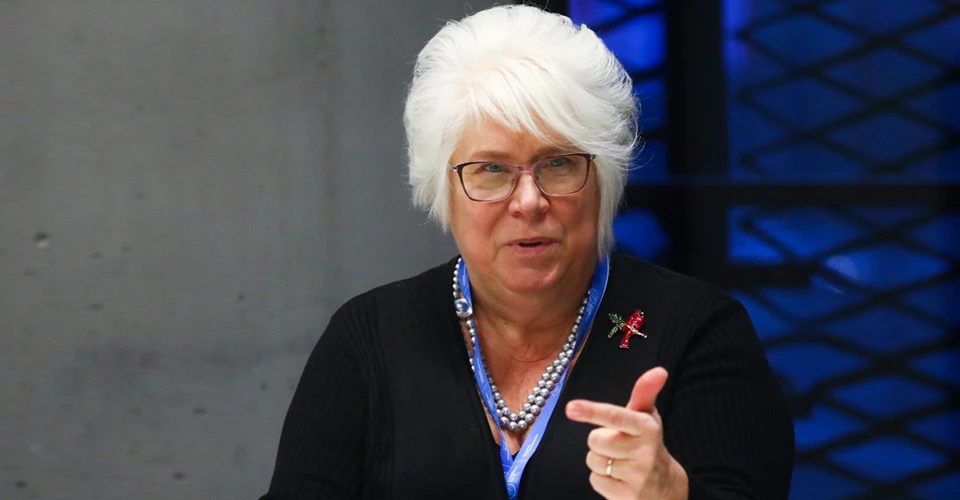
Marina Kaljurand, photo: gettyimages
How about government communications in this context, especially when it comes to explaining to the youth the necessity of completing reforms? This is often a key theme in Russian propaganda, especially given our situation. Perhaps you could share Estonia's experience? How did you communicate these issues during preparations for EU accession in 2003?
The EU support at that time was 67%, which wasn't a high figure. Over time, it increased, and today we are simply happy with EU membership and the referendum that made it possible. The main issue was how to explain this transition. Why are we moving from one union to another? Previously, we received orders from Moscow, now from Brussels.
To convince people, we used positive examples. For instance, there were concerns that the Estonian language and culture would disappear. We pointed to Ireland, which was a relatively poor country but is now successful, with Irish being an official language of the EU today.
We ran a campaign where diplomats and Ministry of Foreign Affairs staff traveled around the country, talking to people and explaining things. One time, an elderly person asked, "What will we get? We will never be rich pensioners like the Germans, and we will die before we see the benefits." I replied, "Think about your children and grandchildren. Even if you don’t become wealthy like the Germans, your descendants will have the chance to live in a free Europe, travel, and have a better life."
Share personal stories, involve people from the EU who have similar experiences, and let them share their stories with your people. For example, those who come from the former Soviet Union can share how they felt the benefits of EU membership. This personal connection can make the message more relatable and impactful.
You mentioned examples from other countries. Which other countries could serve as models for Ukraine?
Your examples could be Estonia, Latvia, and Lithuania. We have Ukrainian communities that have lived here for years, their children go to schools, and they receive social benefits. They can share what it means to live in another EU country. The Baltic states are a good example. For us, Finland was a model, as 50 years ago it had the same level of development as Estonia. Now, it is much ahead.
There is concern about American political turbulence and the issue of continuing the war. Some countries support Ukraine's military industry. Do you see prospects for developing mechanisms to support the military component of the economy?
I am not an expert in this area, so I cannot provide specific advice. However, I would recommend discussing this with Commissioner Kubilius, who is responsible for defense in the new European Commission. There are countries that seriously support Ukraine, spending more than 2% of their GDP, but there are also those that make only symbolic statements, and their actual contributions are almost invisible. This needs to change.
Regarding foreign policy, you must align it with the EU. Resolutions, sanctions, joint statements - everything needs to be adopted by candidate countries. Right now, your situation is unique due to the war, but after it ends, foreign policy will become an important element of your membership. Consistency must be high, otherwise, it will attract criticism.
Afterword to the interview by the author. The path of Ukraine's European integration will depend not only on internal reforms but also on the ability to effectively work and convince external partners to support our country's membership in the EU. At the same time, with the reform of the economy and political system, dialogue with countries that remain skeptical about Ukraine will have to be established. However, as the experience of Estonia and other countries shows, the most difficult changes can truly be implemented with political will, societal unity, and an understanding of the long-term advantages of integration. Convincing European partners, educating citizens, developing strategic sectors of the economy, and effective diplomacy are the key components of success.
The material was published within the framework of the project “Democratic Integration, Resilience, and Engagement” (Ukraine-DARE), implemented by Democracy Reporting International (DRI) in cooperation with the Reanimation Package of Reforms Coalition and the Center for Political and Legal Reforms with the financial support of the Federal Foreign Office of Germany. The project aims to facilitate the approximation of Ukrainian legislation to the EU norms, build a dialogue on the challenges to democracy in Ukraine during the war, and promote civic engagement of young people. The opinions and views expressed in this material do not necessarily reflect the position of the Federal Foreign Office of Germany.

- News






